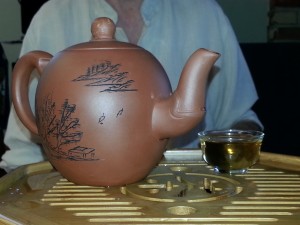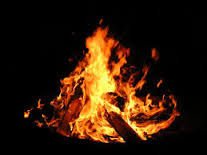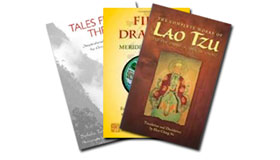There was once a rich man from the country of Chou. He had a huge estate and many workers, who he drove unmercifully. Day after day they toiled under the hot sun to fill the coffers of the rich man.
One of these was an old man who had been working for the rich man’s family for many years. His body was nearly worn out with hard work and little rest; his muscles were stringy and his breath came in gasps, but still the foreman drove him on. At the end of the day, however, once he had laid his weary head down on his rice bag pillow, he dreamed he was a rich man with a huge estate. All night long he was waited upon by servants, fed rare delicacies and entertained by beautiful women who played lovely and haunting melodies and danced ancient and graceful dances for him. He spent the entire dream in idle pursuit, dandling his fat young sons on his knees and laughing into the night.
Of course, upon waking, the old man was once again the lowly laborer who spent his day in endless toil. When the noonday break came and he sat heavily down to eat his rice, his face showed his weariness. His friends would then try to console him. “No need,” he would say. “By day I am a slave to the rich man but at night I am the rich man. I spend half my life working his fields but the other half I spend in ease and comfort. Therefore do not pity me.”
On the other hand, when the rich man, who spent his days in useless frivolity, laid his head upon his silken pillow, he tossed and turned and groaned all through the night. He dreamed he was a common laborer in his fields. All through the dream he worked, bent over, with muscles aching and sweat pouring down his face. For his noon meal he ate the coarsest rice with no flavor and, instead of sweet wine, he drank brackish water, not even tea. At the end of his labors he collapsed on his pallet, all alone in his little hut—his wife had died long ago and his children had left to find a better master far away. His life meant unending toil, with no rest and no respite, for his master was cruel and demanding. This life was truly miserable.
When he awoke in the morning the rich man’s muscles ached as if he had worked in the fields all night, his bed was soaked with sweat and his mouth tasted dry and dusty.
When he complained to his friends they told him, “Don’t worry. By night you may suffer but by day you are a rich man, well respected in the business community, and you have far more than you will ever need. You are at the top of the ladder; that is why you dream at night that you are at the bottom. You cannot have it both ways. Things must balance. That is why you have those vexing dreams.”
The rich man thought about this, as each day he awakened more weary than the day before. He took to walking over his estate to try to relax his agitated mind. He saw his workers there, toiling in the hot sun all day. He noticed in particular one old man who never stopped working, who was shriveled and bent over by many years of hard labor. Yet he never complained, never shirked, and always had a small smile on his face. “I envy that man,” he thought. “He has nothing yet seems so much happier than me.”
The old worker saw the rich man watching him. He noticed how the rich man looked drawn and tired. His skin was pasty and drooped from his face in an unhealthy way. He noticed that the hands of the rich man, as soft and manicured as they were, shook and that his soft, fat body looked weak and tremulous
After a time, the rich man decided it would be better if he changed his ways, since he was not happy with the way things were going. He lightened up on his workers, gave them more time off and began himself to be more physical, which after a time, made him feel immeasurably better. Not only that, but his nightmares went away and he slept more soundly than he had in years.
As for the old man, he too began to enjoy his waking life more and did not need to escape each night into dreams. Instead he too slept soundly. As the Ancient Sage says: “The Realized People of old forgot themselves when awake and did not dream when they slept.”
Liezhi (from Tales of the Tao by Solala Towler)
Drinking tea with Tao is about letting go of all our “stuff” and just being ourselves
as we really our, in our true nature.
Aaron Fisher (Wu De)
We talk a lot about the lower dantian in qigong training. Actually we use it also in meditation and nei dan (internal alchemy) practice as well. The lower dantian, while the first (if you count from the bottom) of three dantians, it is considered the foundation level. As in building a house, we have to start at the bottom, rather than at the top. Many people, on first learning meditation, want to start at the top and begin working with the upper dentian or third eye center and often get themselves into energetic trouble. To the Daoists, it is very important that one builds a foundation before beginning such practices. It’s like attempting to put the roof on before building the foundation. The center will not hold.
Of course middle dantian or heart center practice is very important. As a matter of fact, this is the center that women are often told to begin with. In Daoist tradition, woman are seen as not only energetically superior to men but are also spiritually superior as well. This is, of course, a generalization but many women have a much easier time opening their hearts to Source than many men do.
In any case, beginning with the lower dantian is always a good way to go. The lower dantian is also closer to our kidney center, which is where our jing is said to be stores. Jing, which we receive at conception, is the repository of our sexual energy. This can also be linked to the aging process. (Here again, women have a better deal than men since they don’t lose jing energy during sex, as men do. Go to any retirement center and you will see many more women there than men, who don’t usually live as long. Of course, this is a whole other subject. For more on this look at my book The Tao of Intimacy and Ecstasy.)
Good sexual energy doesn’t just mean good sex but also good reproduction and even a sense of vital health and greater creativity as well. And, since the kidneys are associated with the water element the lower dantian is also associated with water.
On the other hand, the middle dantian or heart center is associated with the element fire. In Daoist tradition, the heart is also the home of the mind. Most of what we think of as the cognitive mind is said to live in the heart center. In basic nei dan meditation we are taught to put the fire energy of the mind down into the water center of our lower dantian. This is often illustrated as a cauldron with the fire underneath the water.
What happens when fire is placed under water? The water turns to vapor, or qi, and rises. This is part of the process of transforming water or jing into qi or vapor. It is the beginning of a long process of transforming or transmuting jing energy to qi, qi to shen or spiritual energy and then shen to Dao – the mystical journey in Daoism.
But the lower dantian, the belly, is the place to start. In Chapter Three of the Daode Jing Laozi tells us that sages “empty their heart/minds and fill their bellies (dan tian).” What do they fill them with? With qi, with intention, with focus, with breath. By breathing slowly and deeply “from our heels” as Zhuangzi said, we fill our abdomen, allowing it (not forcing it) to expand when we inhale and contract as we exhale. (Of course there are other breathing patterns used in Daoist practice but this is the basic one). By building a strong foundation in our lower dantian, by bringing the fire of the mind into the water of the belly we are able to begin the process of transforming our jing, transmuting our qi and enhancing our shen – all steps in the long path of bringing ourselves back to our Source, to Dao.
When inner light shines forth, outward appearances are forgotten. It is all too easy to forget what should not be forgotten and not to forget what should be forgotten. This is true forgetfulness!
Zhuangzi
I went to a concert last week with a friend. It was outside of town in a beautiful meadow with a wooden stage at one end. It was great to be in the country and visit with various friends and listen to the deep devotional music of my friend Matura, who was accompanied by much of the cream of Eugene musicians. After his set another pretty amazing musician named Fantuzzi came up on stage and shared his wonderful heart soul music with us (also accompanied by the creamy musicians.) As evening came on and the stars came out I realized that I would probably get home too late to do my qigong practice. I decided to move over out of the light of the stage and fire into the darkness at the edge of the meadow and see if I could do my practice to the drumming, didge and singing that was going on.
It actually worked out pretty well as I found a rhythm in my form (Primordial Qigong) that worked with the rhythms that were coming from the stage and from the audience. It was a good reminder for me that qigong practice is much more flexible than we often give it credit for. My slow gentle movements meshed very well with the tribal sounds that were dancing thru the meadow that night.
Lately, doing my practice twice a day has had great benefits. And the energetic differences of doing it in the morning and then doing it again at night is very interesting. Not to mention my own energy first thing in the morning and then close to the end of my day at night.
It reminds me that our qigong practice can be experienced in so many different ways. We can move with the different rhythms of life that are constantly going on all around us. We can find a way to flow with and play with and dance with all the currents that carry us along our way……
If we are open and easy about our practice….if we are free in our hearts and spirits (the same thing in Daoism)…if we don’t allow ourselves to get stuck in any one place that is “the correct way” to practice…if we really invest ourselves in our practice…if we really let the practice itself be our teacher…then we will find ever new vistas, opportunities, experiences and levels within levels of cultivation.
Out in that meadow, under the stars, with the music throbbing the night and my friends gathered in front of the stage or back at the bonfire, was a gift and a joy, both with my qigong practice and the opening of my own heart/mind. I am grateful, as always, to my teachers, my practice, my sweetie, and my friends in Dao and indeed!
“Eternity, it’s all around, it’s in the sound.
Love comes down with the rain, the lovely rain.”
Matura – Dharma Wheels – www.maturamusic.com
“It’s all love or calling for love.”
Fantuzzi – Divine Inspiration – www.fantuzzimusic.com






